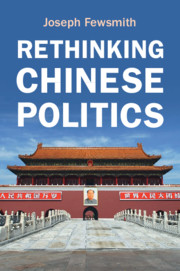Book contents
- Rethinking Chinese Politics
- Rethinking Chinese Politics
- Copyright page
- Dedication
- Contents
- Tables
- Figures
- Acknowledgments
- Abbreviations
- Introduction
- 1 The Dengist Structure of Power
- 2 Succession and the Art of Consolidating Power
- 3 Hu Jintao and the Limits of Institutionalization
- 4 The Pathologies of Reform Leninism
- 5 Xi Jinping’s Centralization of Power
- 6 The Nineteenth Party Congress and Reinvigorating Leninism
- Conclusion
- Bibliography
- Index
3 - Hu Jintao and the Limits of Institutionalization
Published online by Cambridge University Press: 10 June 2021
- Rethinking Chinese Politics
- Rethinking Chinese Politics
- Copyright page
- Dedication
- Contents
- Tables
- Figures
- Acknowledgments
- Abbreviations
- Introduction
- 1 The Dengist Structure of Power
- 2 Succession and the Art of Consolidating Power
- 3 Hu Jintao and the Limits of Institutionalization
- 4 The Pathologies of Reform Leninism
- 5 Xi Jinping’s Centralization of Power
- 6 The Nineteenth Party Congress and Reinvigorating Leninism
- Conclusion
- Bibliography
- Index
Summary
This chapter shows, even more vividly, how difficult it is to pass power on in a Leninist system. Jiang Zemin only allowed Hu Jintao to succeed to office because of the decision of Deng Xiaoping. Even then, Jiang manipulated the “rules of the game” so that Hu Jintao could not consolidate power. Even in his second term, Hu Jintao, though stronger, could not consolidate power. He was able to promote a significant number of his followers, but few of them were able to attain positions of real significance. Hu was never able to control the military.
- Type
- Chapter
- Information
- Rethinking Chinese Politics , pp. 86 - 108Publisher: Cambridge University PressPrint publication year: 2021

